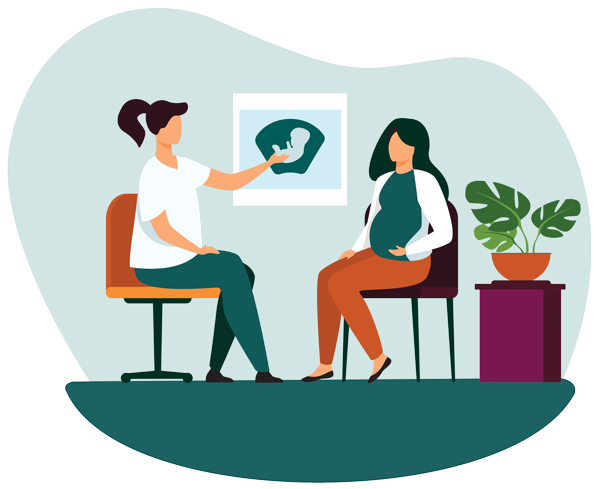Abdominal, Urinary Tract, Testicular Ultrasound Scan

Abdominal, Urinary Tract, Testicular Ultrasound Scan
At London Private Ultrasound (LPU), we offer comprehensive scans for the abdomen, urinary tract, and testicles, tailored for male patients above 18. Common indications for this ultrasound include generalized discomfort in the abdomen, blood in urine, testicular anomalies, and lower back pain. This assessment covers a range of abdominal organs, from the liver and spleen to the bladder and prostates, down to the testes and its blood supply. A family history of related medical issues makes regular check-ups beneficial. Our Abdominal, Urinary Tract and Testes/Scrotum Ultrasound is an efficient, non-intrusive method to detect potential issues early on.
The Abdominal, Urinary Tract, and Testicular private ultrasound scan are necessary to assess the overall health and wellness of the male reproductive system. This non-invasive scan allows doctors to evaluate various structures including the liver, gallbladder, kidneys, bladder, prostate, and testicles. It is a safe and painless procedure that uses sound waves to create detailed images of the internal organs, enabling physicians to detect any potential abnormalities or conditions that may require further attention.
This scan is particularly important for men who experience symptoms such as abdominal pain, difficulty urinating, or testicular discomfort. It can also be a preventative measure for those who may be at risk of developing certain conditions, such as prostate cancer or kidney stones. With the Abdominal, Urinary Tract, and Testicular private ultrasound scan, men can take control of their health and proactively address any issues before they become more serious.
Frequently Asked Questions:
Why do I need to have an Abdominal, Urinary Tract, and Testicular private ultrasound scan?
There could be various reasons why someone might require an abdominal, urinary tract, and testicular private ultrasound scan. These scans are primarily used to assess different parts of the body for any abnormalities or conditions that might require treatment. Abdominal scans can help diagnose conditions related to the liver, gallbladder, pancreas, kidneys, and spleen. A urinary tract scan can detect problems with the bladder, ureters, or kidneys such as kidney or bladder stones, urinary tract infections or tumors. Testicular scans are done to examine the testicles for any abnormalities and to look for signs of conditions like testicular torsion, tumors, cysts, or inflammation. Overall, these scans can provide a non-invasive and accurate way to diagnose conditions and help to determine appropriate treatment options.
What issues can an ultrasound of the testes and scrotum detect?
An ultrasound scan of the testes and scrotum can identify:
- Testicular growths
- Varicoceles (enlarged scrotal veins)
- Testicular torsion (twisted
- testicular structures)
- Epididymal inflammation
- Hydrocele (fluid
- accumulation around the testes)
- Spermatocele (cysts filled with fluid on the epididymis)
- Blood flow to the testes forinsights into overall health and functioning.
Doctors might recommend this ultrasound due to:
- Testicular discomfort
- Testicular enlargement
- Unusual findings during a routine checkup.
Various disorders that can be detected include:
- Scrotal hernias
- Infections around the testes
- Tumors
- Traumas
- Vein swelling in the scrotum
- Fluid retention in the testes
- Testicular size irregularities.
What is covered in the private ultrasound scan for men's abdomen, urinary system, and testicles?
- Evaluate your liver, gallbladder, pancreas, abdominal aorta, spleen, kidneys, ureters, bladder, prostate, testis, epididymis, scrotal sac, and testicular blood supply.
- Discuss your pertinent medical history.
- Provide a consultation lasting up to 10 minutes.
- Clarify all observations during and post-scan.
- Deliver an official report, including relevant images, either immediately or within 24 hours.
- Suggest a subsequent ultrasound if required.
- Provide referrals to a GP or specialist and arrange a Blood Test if necessary.
When should you ask for an ultrasound of the abdomen, urinary trac, testicles and scrotum?
You should consider requesting an ultrasound of the abdomen, urinary tract, testicles, and scrotum in the following situations:
- Abdominal Discomfort or Pain: To identify causes such as gallstones, liver disease, kidney stones, or other abdominal abnormalities.
- Urinary Issues: Such as frequent urination, painful urination, or blood in the urine which could be indicative of bladder or kidney issues.
- Testicular Pain or Swelling: To determine the cause, which could range from infections like epididymitis to more severe conditions like testicular torsion.
- Lumps or Masses: If you or your doctor feel an unexplained mass in the testicles or scrotum.
- Trauma: To assess the extent of injury to the abdominal or scrotal region.
- Monitoring Conditions: For those with known issues, like liver disease or kidney disorders, to track the progress or status of the condition.
- Post-Surgical Evaluation: To check the status of the operated area or organ after surgery.
- Family History: If there’s a known family history of kidney, bladder, or testicular diseases.
- Infertility Assessment: To check for conditions like varicoceles which can affect fertility.
- Routine Health Screenings: Especially for those at a higher risk due to factors like age, health conditions, or lifestyle habits.
If you have symptoms or concerns in any of these areas, it’s essential to consult with a healthcare provider to determine if an ultrasound is appropriate for you.
What is the abdominal, urinary tract, and testes/scrotum ultrasound procedure?
The abdominal, urinary tract, and testes/scrotum ultrasound is a non-invasive imaging procedure that uses high-frequency sound waves to produce images of the internal organs. Here’s a general overview of the procedure:
- Preparation: Depending on the specific ultrasound, you may be asked to fast for several hours before the procedure or to arrive with a full bladder. You’ll be given specific instructions based on the area being examined.
- Positioning: Once in the examination room, you will be asked to lie down on an ultrasound table, usually on your back.
- Exposing the Area: You’ll need to expose the area being examined. For abdominal and urinary tract scans, this typically means lifting or removing clothing and using a sheet or towel for modesty. For a testes/scrotum ultrasound, you’ll need to expose the scrotal area.
- Applying Ultrasound Gel: A clear gel is applied to the skin. This gel ensures a smooth movement for the transducer (the handheld device that sends and receives the sound waves) and eliminates air pockets between the skin and the transducer for clearer images.
- Scanning: The sonographer will press the transducer against your skin and move it around to capture images from different angles. You might feel slight pressure, but it should not be painful.
- Instructions: During the scan, you might be asked to change positions, hold your breath briefly, or perform other actions to get clear images of certain organs.
- Post-Scan: Once the necessary images are taken, the ultrasound gel will be wiped off, and you can dress.
- Discussion: Some sonographers might discuss preliminary findings with you, but in most cases, a radiologist or your doctor will review the images and provide a detailed report later.
- Report: You’ll typically receive a formal report on the findings within 24 hours, which will be discussed with you by your healthcare provider.
- Follow-up: Depending on the findings, further tests or treatment recommendations may be given.
Remember, ultrasounds are a safe and commonly used imaging technique, providing valuable insights without the use of radiation.
What is Pre-examination preparation for this scan?
- Do NOT eat for 6 hours prior to examination time.
- Do NOT Drink any fizzy drinks.
Drink One liter of still water (2 Pints) One hour before your scan. - Medication can be taken as normal.
- If Diabetic, please stick to your normal routine.
Abdominal, Urinary Tract, Testicular Ultrasound Scan
Checks for:-
Liver & Gallbladder
-
Kidney
-
Spleen
-
Pancreas
-
Abdominal Aorta
-
Biliary system
-
Ureter and Bladder
-
Prostates and Testes
-
Epididymis and Scrotal sac
-
Signs of Infection or Injury
-
Varicoceles Impacting Fertility
-
Size and Structural Assessment
-
Signs of inflammation
-
Lumps, Masses & Tumours
-
Abnormalities
10 Years of Experience
Our Medical Ultrasound specialists are fully qualified with more than 10 years of experience. They are accredited and registered with their respective governing bodies.
latest technology
Using the latest technology, We follow all local protocols and national guidelines to provide the best diagnostic ultrasound service in London.
No Waiting List
We offer urgent appointments with no waiting list. We also collaborate with Private GPs, Specialists, and an onsite Pathology Laboratory.
No need for Referral
We offer a professional and affordable private Ultrasound Scan Service, allowing you to self-refer without the need for any referral from your GP.

